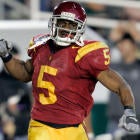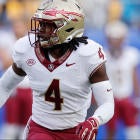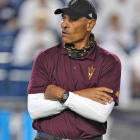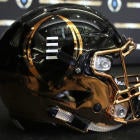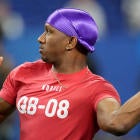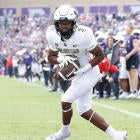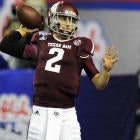Three U.S. Senators sent letters Thursday to the presidents of the 65 universities that comprise the five major conferences seeking answers on how they treat college athletes.
The letter written by Sen. Jay Rockefeller (D-W. Va), Sen. Claire McCaskill (D-Mo.) and Sen. Cory Booker (D-N.J.) said the senators have grown “increasingly frustrated with the lack of meaningful progress by the NCAA and its member institutions.” The senators asked the presidents to answer 21 questions on various topics ranging from multiyear scholarships to campus violence.
Because the five major conferences now have autonomy to create their own rules, “you now possess the authority” to create reform in college sports, the senators wrote to the university presidents.
“As such, we intend to monitor your progress to see whether the very schools and conferences that are often blamed for much of the problems plaguing intercollegiate athletics today effectively utilize the new flexibility you have been granted to implement meaningful reforms to better protect student-athletes,” the letter states.
Rockefeller chaired a Senate committee hearing on July 9 in which NCAA President Mark Emmert appeared. At the time, Rockefeller and some other senators expressed frustration at some of Emmert’s answers.
On Thursday, Rockefeller, McCaskill and Booker asked all 65 university presidents in the Power 5 conferences to answer questions related to these topics by Oct. 17. The Power 5 conferences have until Oct. 1 to submit the first round of autonomy legislation that could be passed in January.
1. Multiyear scholarships.
a. Does your university currently provide, or will it provide, multiyear or four-year scholarships to student-athletes? If so, please explain any and all applicable qualifiers, conditions, and limitations to such scholarships?
b. Will your university support reforming NCAA policies to require the provision of multiyear or four-year scholarships to student-athletes?
c. Does your university currently provide permanent student-athlete scholarships that are not revoked once a player is injured while participating in a sanctioned sports-related event? If not, explain why.
2. Completion of Coursework
a. Does your university currently allow or plan to allow student-athletes to complete all coursework, at no cost to the student-athletes, in order to acquire an academic degree after they exhaust their eligibility to participate in athletics? If so, please provide any and all applicable qualifiers, conditions and limitations.
b. Will your university support reforming NCAA policies to require all schools to allow student-athletes to complete coursework toward an academic degree after they exhaust their athletic eligibility?
3. Health Care
a. Does your university currently provide, or will it provide, comprehensive health care coverage to student-athletes — during their time at your institution and afterwards — for all sports-related injuries? If so, please provide details on the scope of the coverage, such as cost-sharing and the length of time such coverage will be provided. Also indicate when the university began offering or will begin to offer such coverage.
b. Will your university support NCAA policies that mandate all schools provide comprehensive health coverage for sports-related injuries?
4. Concussions
a. Has your university adopted and enforced, or will it adopt and enforce, protocols that minimize the risk of sports-related head injuries? If so, please provide details on such protocols and how the university currently monitors and enforces, or plans to monitor and enforce, strict compliance.
b. Will your university support strict, enforceable NCAA rules that minimize the dangers of sports-related head injuries?
5. Time limitations on Athletic Activity
a. Does your university currently enforce, or have plans to enforce, strict time limitations on athletics-related activities, including playing time, practice times, and team meetings, in order to allow student-athletes to spend more time on academics and other activities, such as internships and working in a job? If so, please provide details on what those limitations are or will be, and provide details how the university will monitor and enforce strict compliance.
b. Will your university support strict NCAA enforcement of existing time limitation rules and/or the adoption of new, stronger, and enforceable rules that limit time spent on athletic activities?
6. Academic Progress
a. Does your university currently monitor or have plans to monitor the academic progress of student-athletes to maximize their chances at academic achievement? If so, please provide details on how you currently monitor or will monitor their progress, how the university provides or plans to provide all necessary resources, and how the university appropriately tailors the curricula to meet individual needs.
b. Will your university support NCAA policies to better monitor the progress of student-athletes, including after they exhaust their eligibility, and to require institutions to maximize academic achievement (with sufficient resources and appropriately tailored curricula) or to prohibit harmful practices that burden academic achievement?
7. Cost of Attendance
a. Does your university currently provide or plan to provide financial-aid packages (including scholarships) to student-athletes that cover the full cost of attendance? If so, please provide details on how you calculate the full cost of attendance.
b. Will your university support reforming NCAA policies to provide all student-athletes with financial-aid packages that cover the full cost of attendance?
8. Financial Compensation
a. What is your university’s position on allowing college athletes to seek some amount of financial compensation stemming from their athletic services — such as for merchandise that use athletes’ names or likenesses, autographs, or other types of revenue-generating activities — similar to how Olympic athletes are compensated? If your university would allow such compensation, please provide details on the scope and nature of such activities for which student-athletes would be allowed to seek financial compensation.
b. Do you intend to seek to reform NCAA policies to allow college athletes to seek similar financial compensation?
9. Due Process
a. Does your university provide student-athletes adequate information and resources, including but not limited to legal representation, to help student-athletes accused of violating NCAA rules navigate the complexities of NCAA procedure? If so, please provide details on the information and resources available to student-athletes.
b. Will your university support NCAA policies to provide student-athletes with due process and legal representation when facing NCAA investigations for alleged infractions?
10. Interpersonal Violence
a. Does your university have a uniform, campus-wide policy in place that is applicable to all students for investigating and adjudicating allegations of interpersonal violence, including but not limited to sexual assault and domestic violence?
b. Will your university support NCAA policies to require member institutions to develop uniform, campus-wide policies applicable to all students for the handling of allegations of interpersonal violence, including but not limited to sexual assault and domestic violence, and also support such policies prohibiting the involvement of athletic departments in such proceedings?












